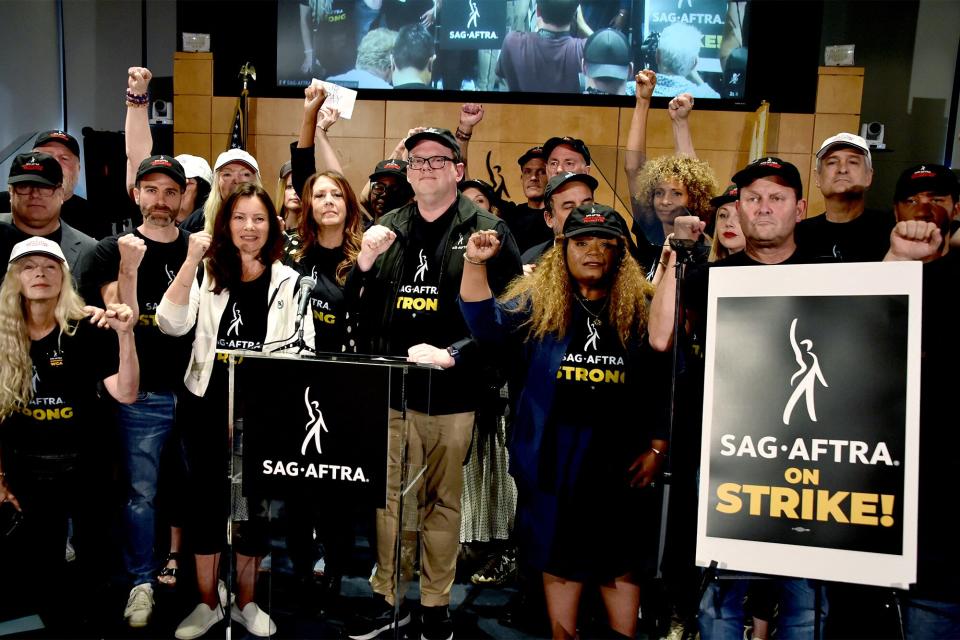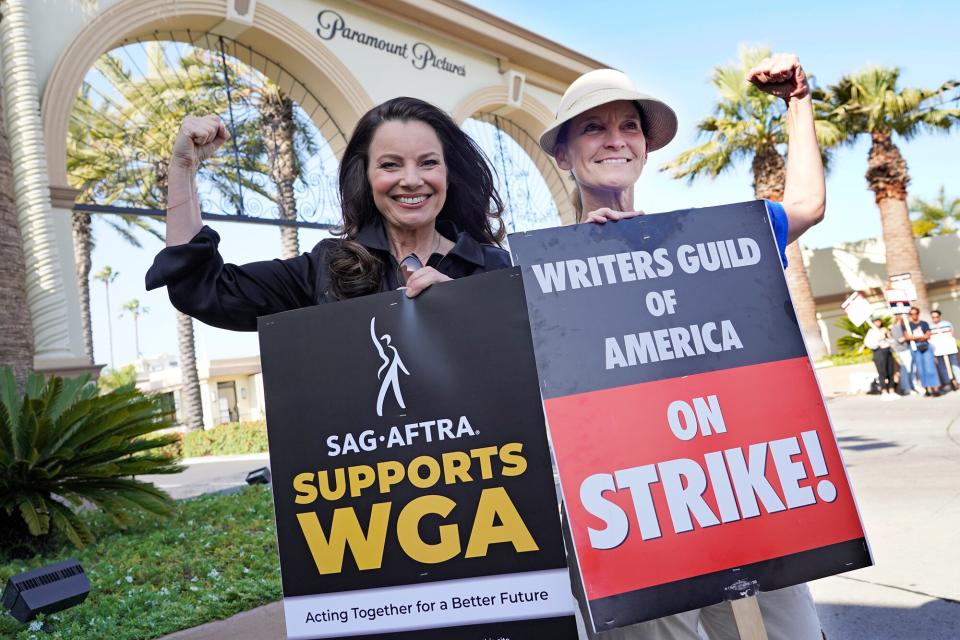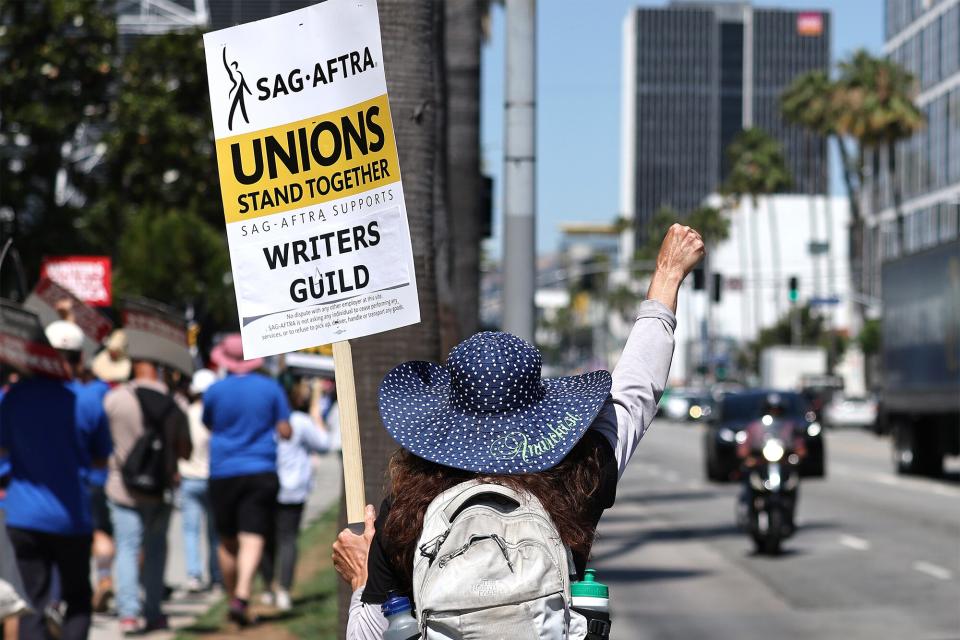SAG-AFTRA strike updates: Everything we know about the actors' strike and what happens next
- Oops!Something went wrong.Please try again later.
- Oops!Something went wrong.Please try again later.
The nearly 160,000 members of SAG-AFTRA are on strike.
On Thursday, the Screen Actors Guild - American Federation of Television and Radio Artists (SAG-AFTRA), the union that represents all performers on film and television, announced its national board voted unanimously to launch the guild's first strike. The news was unveiled by SAG-AFTRA President Fran Drescher (yes, The Nanny star) and National Executive Director & Chief Negotiator Duncan Crabtree-Ireland during a press conference, following the expiration of the union's current contract and a 12-day extension of contract negotiations with the Alliance of Motion Pictures and Television Producers (AMPTP).
But what does this mean? And why is it happening? Read on for everything you need to know.

CHRIS DELMAS/AFP via Getty Images Members of the SAG National Board stand in solidarity
When are the actors going on strike?
The SAG-AFTRA theatrical, TV, and streaming strike went into effect on Friday, July 14, at 12:01 a.m. PT.
Why are the actors going on strike?
The short answer is that the SAG-AFTRA bargaining committee and AMPTP could not reach an agreement to form a new contract after their previous one expired on June 30.
But the reasons for a strike are many. SAG-AFTRA has faced a host of radical changes as the industry has pivoted away from more traditional models of theatrical distribution and network and cable television in favor of streaming. The issues at hand include the use of AI in generating and perpetuating actors' likenesses, as well as residuals and data transparency for streaming projects. Other points of conflict are also salaries, particularly for guest stars, costars, and background actors, as rising inflation and the cost of living increasingly prevent many working actors from earning a living wage.
Drescher summed up the reasons for a strike in a press conference speech. "We are being victimized by a very greedy entity. I am shocked by the way the people that we have been in business with are treating us," she said. "I cannot believe it, quite frankly. How far apart we are on so many things. How they plead poverty, that they're losing money left and right while giving hundreds and millions of dollars to their CEOS. It is disgusting. Shame on them. They stand on the wrong side of history at this very moment."
She continued: "The entire business model has been changed by streaming, digital, AI. This is a moment of history that is a moment of truth. If we don't stand tall right now, we are going to be in trouble. We are all going to be in jeopardy of being replaced by machines and big business, who cares more about Wall Street than you and your family."

Chris Pizzello/AP Photo Fran Drescher, left, president of SAG-AFTRA, and Meredith Stiehm, president of Writers Guild of America West, during a rally by striking writers on May 8, 2023
What can't actors do during the strike?
When it comes to on-camera work in film, television, and digital content, they are not allowed to act, sing, dance, perform stunts, pilot on-camera aircraft, work as a puppeteer, or participate in performance capture or motion capture work. This also includes work as a background actor, stand-in, or photo/body double. All off-camera work in support of a performance is also prohibited, including ADR/looping, TV and theatrical trailers and promos, voice acting, singing, narration, and stunt coordination.
Pre-production work is also part of the struck work, including fittings, wardrobe tests, makeup tests, rehearsals, camera tests, scanning, interviews, and auditions.
On the press/promo side of things, most activities are off limits as well. Actors may not participate in promotion for work made under the contracts, including press tours, personal appearances, interviews, conventions, fan expos, film and television festivals, FYC events, panels, premieres/screenings, award shows, junkets, podcast appearances, social media, and studio showcases.
Actors also cannot enter into an agreement for work in the future or any merchandising agreements connected to projects under the contract.
What are actors allowed to do?
Although most projects are halted as actors join their colleagues on the picket line, members are allowed to work on projects with non-AMPTP-related production companies under these agreements, such as true independent projects that fall outside the jurisdiction of the union and the AMPTP. They are also allowed to continue their work on soap operas, reality shows, morning shows, talk shows, variety shows, and game shows, as well as union work in commercials, music videos, corporate or educational videos, and news broadcasts, as those all fall under different contracts. Actors can also host or perform on podcasts.
What events might the SAG-AFTRA strike immediately impact?
The 2023 Emmy nominations were announced Wednesday, but now actors are not allowed to promote or campaign for the awards, currently set for Sept. 18. San Diego Comic Con, scheduled for July 20-23, had anticipated a reduced presence from studios due to the ongoing WGA strike, but now, no talent will be permitted to appear either. As we approach fall festival season where most studios make their premieres and early awards push, it is also possible that key events like Toronto International Film Festival, Telluride, and more will be devoid of talent.

Mario Tama/Getty Images A SAG-AFTRA members walk the picket line in solidarity with striking WGA
What projects have been impacted by the strike?
While most U.S.-based production had already halted with the WGA strike, now other projects, particularly some big-budget films, are also hitting pause. On Friday, Deadpool 3 halted production just days after revealing Hugh Jackman in Wolverine's yellow suit alongside Ryan Reynolds' Deadpool. Production has also been paused on Venom 3. Other projects, including Gladiator 2, Wicked, and Paddington in Peru are expected to pause or push back production as well, but they have yet to formally announce anything.
Which actors are going on strike?
Any U.S.-based actor that you are used to seeing on your television or movie screen is part of this strike (and there are serious repercussions for anyone who crosses the picket line or in any way ignores the rules of the strike). This means everyone from the background actor playing a hapless Imperial officer on Obi-Wan Kenobi to Meryl Streep is on strike.
Things get a bit more complicated when you travel outside the United States. For instance, HBO's House of the Dragon will continue filming because of laws in the United Kingdom.
Most actors in the U.K. are not members of SAG-AFTRA, but they are instead represented by U.K. sister union, Equity. Equity General Secretary Paul W. Fleming released a statement standing in solidarity with SAG-AFTRA. But the U.K. offers different protection for union members, which means "that what artists working in the United Kingdom – whether SAG-AFTRA and/or Equity members (or both) – can do, may be different from their comrades in the United States and other parts of the world."
Actors in the U.K. are subject to the laws of the United Kingdom, thus eliminating any protections actors might have if they participate in a strike. "We have been advised by SAG-AFTRA that its strike is lawful according to United States law but we have been advised by our UK lawyers that it is not lawful under United Kingdom law," Equity explains. "Consequently, a performer joining the strike (or refusing to cross a picket line) in the UK will have no protection against being dismissed or sued for breach of contract by the producer or the engager. Likewise, if Equity encourages anyone to join the strike or not cross a picket line, Equity itself will be acting unlawfully and hence liable for damages or an injunction."
The statement also includes a promise to make an effort to put a stop to productions moving overseas and using the U.K. as a backdoor to continue work impacted by the strike.
Which stars are on the picket lines?
Many stars, including the cast of Oppenheimer, George Clooney, and John Cusack, have spoken out in support of SAG-AFTRA and the strike. But who is actually pounding the pavement and hitting the picket line?
On Friday, the first full day of the strike, many recognizable actors were out in full force on both coasts. In New York, Ted Lasso star Jason Sudeikis, Oscar-winner Susan Sarandon, and Star Trek actor Anthony Rapp were all spotted on picket lines around the city, including one in front of NBC's 30 Rockefeller Center.
In Los Angeles, Once Upon a Time star Ginnifer Goodwin was seen outside Paramount, while Netflix's Hollywood headquarters was picketed by Drescher, Lord of the Rings star Sean Astin, and Titanic actress Frances Fisher. More famous faces are expected to be seen on the picket lines in the coming days.
When was the last actors' strike?
Commercial actors went on strike for nearly six months in 2000, the longest strike in SAG-AFTRA history. Before that, a SAG strike on this scale dates back to the 1980s. In 1986, there was a 14-hour strike and in 1980, there was a three month actors' strike.
But the last time that both actors and writers were on strike at the same time was all the way back in 1960. That fight was largely over residuals from movies that played on television. "There had been a fight going on since 1948 by the guilds in an effort to secure residuals when a theatrical movie was played on TV," labor expert and entertainment lawyer, Jonathan Handel, previously told EW. The 1960 strike secured those residuals for actors, writers, directors, and even some crew members. The strike also won the WGA and SAG new health insurance and pension plans.
"That cemented the concept of residuals into the system," said Handel. "Virtually every above-the-line Hollywood strike, since the inception of the unions, has been primarily about residuals, not about basic wages or benefits or rollbacks or what have you."
When will the actors' strike end?
That's one answer we don't yet know. Drescher told PEOPLE that "there's no way to predict" how long the strike may last, while emphasizing the culpability of the AMPTP in its duration. "Until they're ready to come back to the table and talk to us, we'll make it known that they're once again stonewalling us," she said.
Crabtree-Ireland also stated that SAG-AFTRA is united in solidarity for however long it takes to win a fair contract. "This strike will come to an end when [the AMPTP] are ready to come to the table and make a fair deal with our members," he said. "I hope that's next week. But if that's next month, or if it's two months from now or longer, I have every confidence our members will stand united and strong until the companies come back to the table and make a fair deal with us."
Sign up for Entertainment Weekly's free daily newsletter to get breaking news, exclusive first looks, recaps, reviews, interviews with your favorite stars, and more.
Related content:

